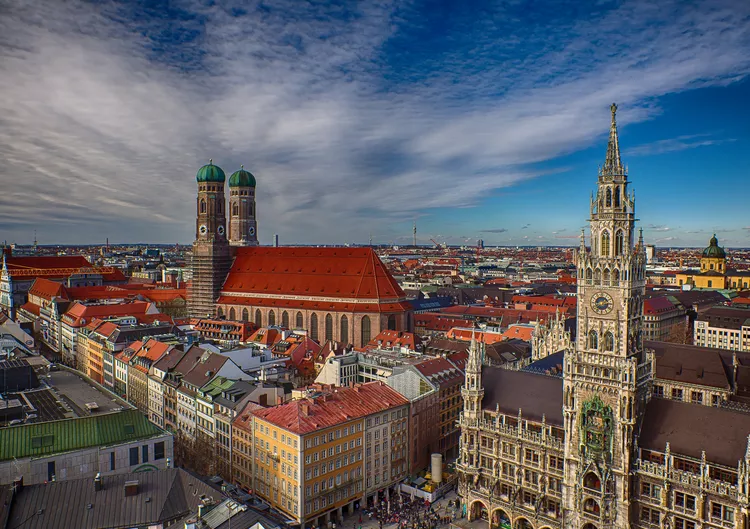Summary of Munich’s Frauenkirche
The Catholic Church of Our Blessed Lady (or Dom zu Unserer Lieben Frau) is commonly known as Frauenkirche in German. It is Munich’s largest church and a major landmark of the city.
Significance of Munich’s Frauenkirche
The Frauenkirche is one of the most recognizable churches in Germany. Together with the Town Hall, the elegant twin towers of the Cathedral define Munich’s skyline, making it an exceptional point of orientation throughout the city.
Indeed, it serves as the epicenter of Munich. If a sign indicates “Munich 12 km,” it denotes the distance to the north tower of the church.
History of Munich’s Frauenkirche
The humble Marienkirche parish church was established at this location in 1271. However, it took almost 200 years to complete the foundation of the late Gothic structure present today.
Duke Sigismund commissioned the renowned architect Jörg von Halsbach for this monumental work. Due to the absence of nearby quarries, brick was chosen as the primary building material. The towers were constructed in 1488, and the iconic onion domes were added in 1525, inspired by the Dome of the Rock in Jerusalem. The church’s towers are so exceptional because they are visible throughout the city, a feature made possible by local regulations prohibiting buildings taller than 99 meters in the city center.
The Frauenkirche experienced significant damage during World War II bombings, with the roof collapsing, a tower being struck, and the historical interior nearly destroyed. Fortunately, one item remained intact: the Teufelstritt, or Devil’s Footstep. This black mark resembles a footprint, said to be where the devil stood mocking the church.
Some speculate it represents a pact between the devil and von Halsbach to secure funding for the church’s construction. Another tale suggests that the devil was so pleased with the church’s windowless appearance from the porch that he stamped his foot, leaving this mark.
The Frauenkirche could originally accommodate up to 20,000 standing visitors (with current seating for 4,000). This is particularly noteworthy given that Munich had only 13,000 inhabitants at the end of the 15th century. An interesting legend holds that von Halsbach succumbed to death precisely as the last stone of the church was placed.
Restoration efforts began immediately after the war, culminating in a completion date of 1994. The site is now open to the public for visitation and services.
Visitor Info for Munich’s Frauenkirche
Visitors can explore the stunning interior and even ascend the south tower for breathtaking views over Munich.
Interior Highlights:
- Teufelstritt
- 15th-century stained-glass window behind the altar
- Imposing figure of St. Christopher from 1520
- Bronze reliefs of three beatified individuals: Mother Theresa, Rupert Mayer, and Kaspar Stanggassinger
- Wooden busts of apostles, saints, and prophets carved by 15th-century Munich sculptor Erasmus Grasser
- More than 20 individual chapels dedicated to saints, apostles, and local trades and guilds
Guided tours are available from May through September on Sundays, Tuesdays, and Thursdays at 3:00 PM from the Orgelmpore.
Address:
Frauenplatz 1, 80331 Munich
Contact Information:
Website: www.muenchner-dom.de
Phone: +49 (0)89/29 00 820
Getting There:
Utilize the subway lines U3 or U6 to reach “Marienplatz.”
Opening Hours:
Daily: 7:30 AM – 8:30 PM in summer; 7:30 AM – 8:00 PM in winter
Climbing the Tower:
Adventurous visitors can ascend the Frauenkirche tower for expansive views of Munich’s skyline and the majestic Bavarian Alps. Note, there are 86 steps to the elevator, though this hasn’t deterred legends such as Anton Adner, who climbed it at the age of 110 in 1819!
Please be aware that the towers are currently closed for construction.
Church Services:
When planning a visit, please note that entry is not permitted during services.
Monday – Saturday: 9:00 AM and 5:30 PM
Sunday and holidays: 7:00 AM, 8:00 AM, 9:00 AM, 10:45 AM, 12:00 PM, and 6:30 PM
Concerts:
For a schedule of concerts and ticket information, check the official website of the Church of Our Lady.




